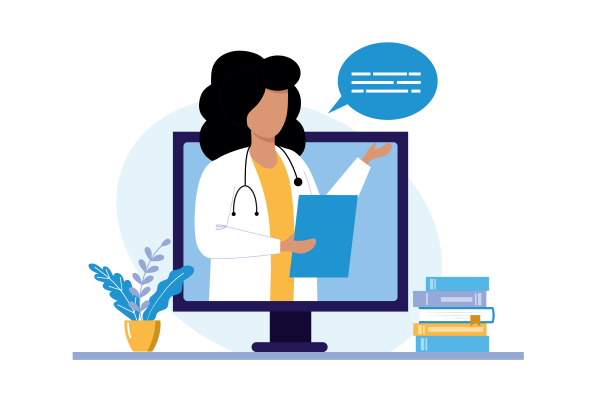
With the broad charge of accurately and quickly answering questions about practice management, membership, and benefits and services, the staff of TMA’s Knowledge Center has an often-heavy load to lift.
But with 20 years of history behind it and a solid foundation of teamwork, the center continues to improve members’ experience.
The model is simple. Staff receive questions and answer them based on their accumulated knowledge and high-quality sources. Calls and emails run the gamut: questions about logging in to membership benefits, medico-legal inquiries, practice management issues, and concerns about current events, from legislation to public health. Such a wide range and volume of information requires the center’s information specialists to be organized, cooperative, continual learners.
And the center’s lineup meets and exceeds those criteria. Physicians and their staff who reach out to the Knowledge Center are accessing a pool of experience that spans decades. Especially after a tumultuous couple of years through the COVID-19 pandemic, center staff feel more prepared than ever to address member needs.
“I created a lot of new files and really started honing in on keeping a lot better notes,” said Gay Anderson, an information specialist for the center. “Still, very, very often I create new resources for myself when I get a question. [COVID] made me a little more efficient.”
Ms. Anderson and fellow information specialist Gerry Juarez, along with the center’s coordinator Stefanie Nanez, use their own notes, along with data the center logs about each call, to answer member questions quickly and accurately. After all, they understand that time is a highly precious commodity to physicians and their staff.
“What can we do for our members without having to transfer? How can we help them rather than keep on passing them down to the next person?” Ms. Nanez asked. “A lot of these physicians don't have 45 minutes to an hour to try and figure out a solution.”
To meet those asks, Ms. Nanez says the team has no choice but to cooperate well and know their strengths.
“And if we need help, we're not afraid to ask each other for help,” she said.
The eagerness to ask for and offer aid is part of the center’s DNA. It’s a service predicated on compassion for others who find themselves in a place of need, and center staff find the role fulfilling.
“It's nice to be able to help physicians who do so much for people in the medical field, especially after the pandemic,” Mr. Juarez said. “A lot of the calls that we got were very stressful on their end. They were in a situation where they couldn't do certain things, and we were the ones who needed to give them information ASAP.”
Successfully getting the right information can sometimes require outside sources, whether it’s additional TMA staff or even agencies or regulating bodies. “At the end of the day, my job is to solve their problem,” Ms. Nanez said. “If I can't do it, let me find someone who can. If that person can't, before the end of the day or before the end of the week – we're still going to solve this problem.”
The Knowledge Center cannot dispense legal advice, though specialists can refer physicians to lists of qualified attorneys. They also cannot answer questions about setting fees, which would violate antitrust laws. What they can do is collect a wealth of information for physicians to use when making hard decisions.
“Many questions cannot be answered with a simple ‘yes’ or ‘no’,” Mr. Juarez said. “We're not going to be able to tell you exactly what to do, but we can give you the guidelines and the rules so you know what you can do.”
Even with those limitations in mind, center staff emphasized that physicians – and their practice staff – can call or email with just about any question. While clinical questions are typically directed to librarian Barbara Tims, the Knowledge Center can pretty much handle any other practice management or membership issues, or escalate them to TMA subject-matter experts.
“We're kind of the sounding board as well,” said the center’s director, Claire Duncan. “If you don't need practical information or guidance, but you just want to vent, we're also here for that.”
Ms. Duncan says the opportunity to connect with TMA members so regularly is a benefit both personally and for the association at large. Knowing firsthand what obstacles physicians are facing guides the preparation of FAQs, whitepapers, and more TMA resources. Utilization of the Knowledge Center feeds a positive loop of improved member experience. And with a qualified team available during normal hours, the Knowledge Center is easier to use than your typical customer service experience.
“It’s really easy to get ahold of us,” Ms. Duncan said. Knowledge Center staff are reachable by phone and email. “We have live human beings answering the phone during business hours, which is rare. You might have to leave a voicemail, but a human being will talk to you.”
For concerns or questions about non-clinical issues related to practice management, membership, benefits and services, and TMA programs and events, contact the Knowledge Center by phone at (800) 880-7955 or email. Clinical and health business research questions will be directed to the Knowledge Center librarian.